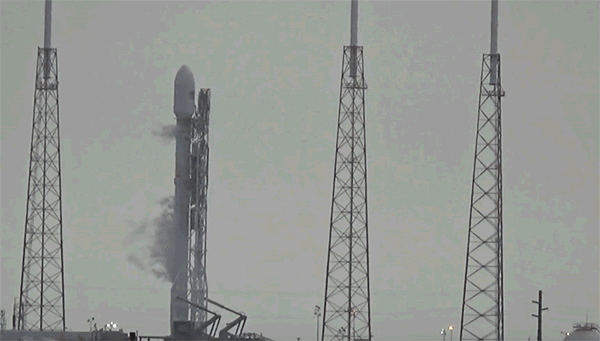Early this morning, SpaceX's Falcon 9 rocket exploded during a hot run, a test fire before a launch planned for this Saturday. And in response, everyone has a lot of questions: What does this mean for SpaceX? What does it mean for its launch schedule? What does it mean for the future of commercial space flight? What does it mean for Internet access in Africa?
Cool your jets. Short answer: Nobody knows anything yet. Figuring out what caused the explosion will take a little while. Figuring out how it will affect the near future of spaceflight will come even later. So, here are all the things you need to know before you can say anything intelligent about the SpaceX explosion.
Right around 1:12, a big fire erupts from the upper third of the rocket. That means the explosion probably originated either in the second stage booster's liquid oxygen fuel, or the hydrazine fuel in the payload itself---a communications satellite from Israeli firm Spacecom Ltd that was bound for geostationary orbit.
What caused the explosion is the butterfly from whence all other implications will flutter. If it was the Falcon 9's second stage, that's bad news for SpaceX, because the second stage propellant is what caused the company's only other failure—a 2015 rocket that exploded shortly after launch. I probably don't need to spell out what it would mean for a space launch company to develop a reputation for explosion-prone rockets.
But the more immediate concern has to do with SpaceX's launch schedule. Currently, SpaceX has nine more scheduled launches for 2016. "They will probably all start doing a combination of looking for other rides into space, or hoping that SpaceX can be back flying quickly," says John Logsdon, space policy expert emeritus at George Washington University. If they have a rocket problem, delays to that schedule are going to be big.
However, if it's the payload that blew, SpaceX's reputation probably won't suffer, and the delays will likely be shorter. Either way, lawyers and insurance reps for both SpaceX, Spacecom, and all SpaceX's future clients are likely whipping together all kinds of briefs to protect their client's assets. And you know, the explosion could have been something else entirely. Maybe a friggin' rat was chewing on cables somewhere in the payload fairing. Point is, nobody knows.
SpaceX leases launchpad SLC-40,1 from which six of the company's nine remaining 2016 launches are scheduled to depart. But the fact that it just hosted 2016's second-raddest bonfire might put all those launches in jeopardy. But again, nobody yet knows if that's the case.
Was SpaceX moving too fast? Will NASA ditch its commercial contracts with the company? What does this mean for other commercial satellite operators? "I've been doing this for a while, seen mishaps like this with other companies. The best remedy is not a kneejerk reaction in trying to figure out what it all means the day of," says Eric Stallmer, president of the Commercial Spaceflight Foundation, an industry group. He points to the diligent investigations following mishaps like Challenger and Columbia, and how results from those trickled into future space policy.
OK, but this is commercial spaceflight. It's subject to markets: Spacecom's stock dropped 9 percent after today's explosion. Sure, Stallmer says, but even private sector companies tend to bounce back after mishaps. "This isn’t like Brexit. It’ll affect certain companies and stock, but it will certainly rebound if company is worth its salt," he says. SpaceX's first three launch failures nearly killed the company, but since its first successful launch in 2008, the company has been a runaway success.
And for the commercial space industry at large? Well, food for thought: SpaceX has been successful, in part, because it offers lower prices than its competitors. "If anything, I think the impact for other launch companies will be to create more business for them," says Logsdon, because there's such a huge backlog of people trying to get their stuff into orbit. "Thing is, I don’t know how much slack there is in the business. This is not exactly off-the-shelf capacity, a rocket large enough to carry something into geostationary orbit."
Stay tuned for updates from SpaceX. So far, the company has offered only the vaguest details. Most important of those: Nobody got hurt.
1UPDATE 11:55 pm Eastern 9/1/16: This story has been updated to correct the launch pad impacted in the explosion; SpaceX also leases launch pad 39A, but it will be used for future launches.
